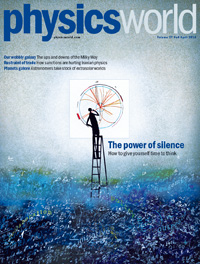By Matin Durrani

If you’re a busy researcher, you’ll know just how precious time can be. But for many physicists, there’s a growing pressure to communicate, collaborate and interact – often at the expense of having time in silence to sit and think.
It’s an issue tackled in the cover story of the April issue of Physics World magazine by Felicity Mellor from Imperial College London, who runs a project called “Silences of Science“. The cover of this month’s issue was specially commissioned by us from artist Dave Cutler.
As Mellor puts it, current research policy – in the UK at least – emphasizes silence’s opposite. “From assessing publications and rewarding collaborations, to requirements for public engagement, policy initiatives urge scientists to speak up,” she writes.
Yet there is a danger, Mellor warns, that in the midst of all this enforced interaction, an important precondition for creativity in physics could be lost. “With all these demands to talk, do scientists still have the chance to think?” she wonders.
If you’re a member of the Institute of Physics (IOP), you can read Mellor’s article in the digital version of the magazine or via the Physics World app, available from the App Store and Google Play. If you’re not yet in the IOP, you can join as an IOPimember for just £15, €20 or $25 a year to get a full year’s access to Physics World both online and through the apps.
The article, which will also be available on this website from 3 April, examines some of the giants of physics who benefited from silence – including Newton, Einstein, Dirac and Cavendish – before ending with this stark observation. “Delete the silences from speech, and one is left with incoherent babble,” Mellor notes. “Delete the silences from scientific research and perhaps the result will be nothing but noise.”
Elsewhere in the April issue, Daniel Clery – author of A Piece of the Sun: the Quest for Fusion Energy – examines a highly critical report into the management of the ITER fusion experiment. You can find out about recent observations suggesting the Milky Way undulates up and down and then take stock of the latest exoplanet discoveries. There’s also a bumper Feedback section, while in this month’s Lateral Thoughts Sidney Perkowitz examines a strange tale about Jackson Pollock.
For the record, here’s a a run-down of the highlights of the issue.
• ITER faces management turmoil – A scathing report into the management of the ITER fusion experiment has thrown the whole project in the spotlight and even calls for the director-general to go, as Daniel Clery reports
• Brazil science minister sets global goals – Marco Antonio Raupp, the mathematical physicist who is now Brazil’s minister of science, technology and innovation, talks to Physics World about the challenges and opportunities for Brazilian research
• Critical Point: Patenting science – Are you aware of cases where patents have hindered or prevented fundamental research? If so, Robert P Crease wants to know
• Penalizing Iranian research – Abbas Ali Saberi calls for an end to sanctions that are hurting physics and physicists in Iran
• Our wobbly galaxy – It is well known that the Milky Way rotates around a supermassive black hole, but researchers have found that our galaxy undulates up and down as well like a giant galactic merry-go-round. Katia Moskvitch reports on this surprising finding
• The power of silence – Collaboration, engagement, outreach – the modern physicist is continually encouraged to keep talking and communicating. Felicity Mellor wonders if it would be better if we simply stayed silent
• Planets galore – With almost 1700 planets beyond our solar system having been discovered, climatologists are beginning to sketch out what these alien worlds might look like, as David Appell reports
• Hunting for neutrinos – Brian Clegg reviews The Neutrino Hunters by Ray Jayawardhana
• Edible lasers and death rays – Jeff Hecht reviews How the Ray Gun Got its Zap by Stephen R Wilk
• Serving an ageing populations – Gerontechnologist Lawrence Normie describes his work on devices that improve the lives and health of older adults
• Lateral Thoughts: The art of falling fluid – Sidney Perkowitz unearths a curious story about Jackson Pollock
Enjoy the issue – and if you have any thoughts on the articles, do e-mail us at pwld@iop.org
Trackback: The Case for Solitude in Science | VORTRA